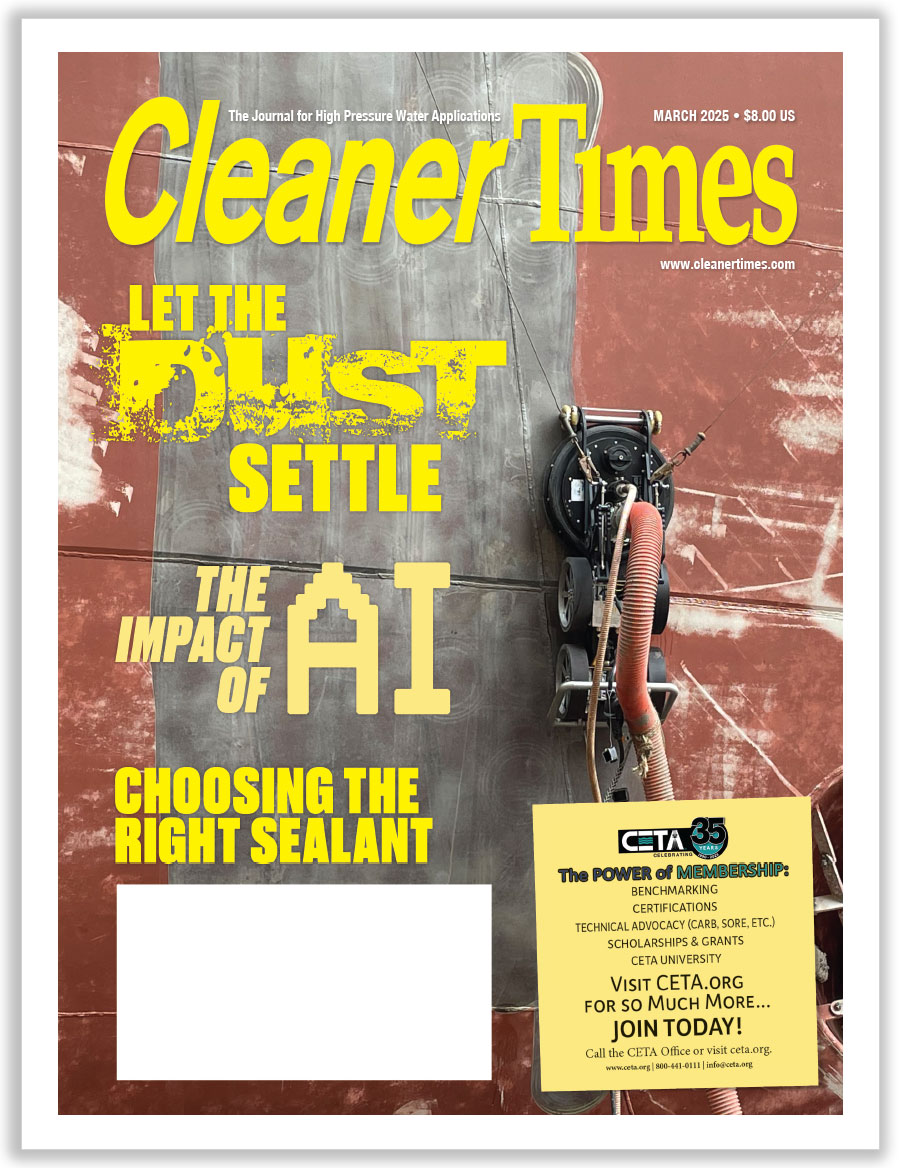
Long-Term Business Property Tax Savings
By Mark E. Battersby / Published August 2023

It is the rare pressure cleaning contractor, supplier, equipment dealer, or distributor who doesn’t attempt to keep the operation’s annual income tax bill to a minimum with either year-round or end-of-year tax planning. Claiming the maximum deductions legitimately available is also a “no-brainer,” with both self-prepared tax returns and those professionally prepared. Why, then, is a bill for a tax that is one of the biggest expenses of many businesses—one that is computed and prepared by the local taxing authorities—often paid without question?
The property tax is a local tax based on the market value of privately owned property such as an operation’s land, buildings, and assets attached to that property. Unlike most taxes, property taxes are calculated by a local assessor, a government employee, multiplying the property’s value and applying the tax rate to the property’s proportionate value.
Another facet of the property tax in many locales requires the business to provide the value of other business assets, including equipment, vehicles, and in some cases even inventory. In these cases, although local officials figure the final property tax bill, it is based on the value of the pressure washing operation’s business property as reported by the business.
Many businesses own little or no property. However, just because the business rents its shop or other property doesn’t mean that property taxes can be ignored. In the Northeast, for example, studies show that property taxes range from 15 to 25 percent of the total rent paid by most businesses.
Low Property Tax Bills
Obviously, understanding the assets owned and rented by the pressure cleaning operation and the local jurisdiction’s property tax rules can help ensure only the fair share of property taxes are being paid. Correcting the appraised value assessed by the local property tax jurisdiction—or ensuring current values of the operation’s other assets are reported correctly—can open the door to property tax savings for years to come.
Nearly all property taxes apply to real property. This includes land, buildings, and all improvements (often called “fixtures”) that can’t be removed without damage to the property. The business property tax is a state or local tax based on the assessed value of the pressure washing operation’s land or real estate, as opposed to its fair market value.
Although the local property tax authorities calculate the annual property tax bill the business is responsible for paying, there are a number of steps that can be taken to reduce the assessed value they base that bill on.
How Accurate is that Assessment?
One of the reasons that business property taxes are so complicated is because they are variable. In other words, an operation’s property is appraised by the local assessor using any one of several methods to arrive at the property’s assessed value. Some localities may use the market value versus an appraised value. In all cases, however, a percentage of the value is used to determine the assessed value.
 Some states impose a statewide limit on the maximum rate, but even so, such systems are obviously ripe for errors. Local jurisdictions impose different tax rates for different types of property such as business property and residential property. However, distinguishing between real and personal property isn’t always simple.
Some states impose a statewide limit on the maximum rate, but even so, such systems are obviously ripe for errors. Local jurisdictions impose different tax rates for different types of property such as business property and residential property. However, distinguishing between real and personal property isn’t always simple.
While one error is often enough to warrant an appeal of a property tax assessment, comparing local properties may be more rewarding.
Basic Grounds for Appeal
It’s important to keep in mind that challenging the amount of property taxes is never going to be successful. Instead, what will be challenged is the assessment made by the municipality’s assessor. The assessors working for the taxing municipality have various levels of experience and expertise. This can often result in key details being omitted or mistakes made but not detected.
Not too surprisingly, there are literally hundreds of variables that can come into play when attempting to determine the value of property from details such as the total square footage and the overall property’s size, to smaller details such as recent improvements. Looking for details that the local assessor may have overlooked or misstated is a great starting point for an assessment appeal.
One of the best ways to gather evidence that a property tax assessment was inaccurately prepared by the municipality is to look at how similar property has been assessed in the municipality’s public records. It’s important to compare properties which are similar in many different aspects, such as the size of the property, additions or modifications, etc. If similar property in the pressure washing contractor, supplier, or equipment distributor’s locality is discovered with lower values, it may be a case for an appeal.
Determining the market value of business property usually involves computing the earning potential and expenses with the local authorities using a percentage of this assessed market value to compute the tax bill.
If the business property was recently purchased or data is available from previous purchases, there is a good chance that a case for appeal exists. Naturally, the property cannot have been purchased “under duress,” or the business is losing ground on evidence.
Real vs. Personal Property Taxes
All too frequently the term “property tax” is associated only with homeowners. However, just as homeowners must pay property taxes on their house, pressure washing contractors, equipment dealers, distributors, and suppliers must pay property taxes on their commercial real estate. Often overlooked is the fact that businesses must do the same with their business personal property.
A pressure washing operation’s property taxes usually fall into one of two categories: real property and personal property. Real property includes stationary assets such as buildings and land. Personal property can be either “intangible” or “tangible.” Intangible property includes such things as trademarks, patents, copyrights, intellectual property, and software.
In addition to intangible assets, the business property tax is often assessed on so-called tangible personal property owned by the business but not physically attached to a location, such as the following:
- Business equipment
- Business vehicles
- Machinery
- General business tools and supplies
- Furniture such as desks and chairs
- Inventory
- Computers, printers, and scanners
- Movable assets and other tangible personal property necessary to conduct the business.
Business Property Tax Audits
On the downside, business personal property tax audits are increasingly more common occurrences and can result in unexpected tax liabilities, penalties, and interest payments. In fact, some audits can cover periods of up to four years, resulting in a time-consuming information-gathering process. Reducing the amount of financial information auditors have control over with concrete data to support lower values and taxes is a service often provided by outside professionals.
The Appeal
Although it can be inefficient and time consuming to track down a jurisdiction’s tax information and requirements, it can reveal a number of errors. But, how can a contractor, supplier, or distributor seeking the lowest property taxes possible discover these omissions and errors?
In addition to the contractor, supplier, or distributor’s own knowledge about his or her property, information on the property can also be found by contacting the assessor. Because, experienced or not, municipal officials are generally pretty smart and rarely intimidated or fooled into reassessing a pressure cleaning operation’s property.
Typically, filling out a couple of forms and submitting a letter or petition will kick-start the appeal process. This is usually a process that can be accomplished by the pressure washing contractor, equipment dealer, distributor, or supplier without outside help. If successful, the adjusted value becomes the new basis for the property tax for years to come.
Finding Professional Help
Although no one knows the pressure cleaning business better than its owner or manager, property tax appeals are time consuming and complex and require understanding the process that exists in every taxing jurisdiction where the business has property. Thus, there may be the need for professional help.
Hiring outside professional assistance can mean success, with less time consumed along with nominal fees. Fortunately, there are firms that will undertake an appeal on a contingency basis where fees are based solely on the amount of a reduced property tax bill over a period of years.
The Bottom Line
Many pressure cleaning contractors, suppliers, or distributors, for whatever reason, are hesitant about appealing the property tax assessment. They may not want to offend the local assessor or feel that appealing is morally wrong or potentially unethical. In reality, however, appealing property tax assessments is quite common and the right thing to do in order to ensure the pressure cleaning operation is paying only its fair share of property taxes.
Calculating and paying taxes, all taxes, is one of the more complicated and tedious parts of operating a business. Further complicating matters, since the business property tax is computed at the local level, a knowledge of business tax laws and the operation’s obligations is a necessity. As with all business taxes, however, that knowledge and attention to detail can help ensure the pressure cleaning operation’s business property tax responsibilities are met at the lowest possible cost. Professional assistance may help.





